Selecting the recommended puppy food for labs is one of the most crucial decisions new pet parents make for their growing companions. Labrador puppies share many nutritional similarities with Golden Retriever puppies, requiring specialized nutrition to support their rapid development and energetic nature. This comprehensive guide explores everything you need to know about choosing the best dog food for lab puppies, from essential nutritional requirements to feeding schedules and brand recommendations that will set your furry friend up for a lifetime of health and happiness.
Contents
- 1 Understanding Labrador Puppy Nutritional Needs
- 2 Essential Nutritional Components for Lab Puppies
- 3 Age-Specific Feeding Guidelines for Lab Puppies
- 4 Feeding Schedules and Portion Control.
- 5 Common Puppy Feeding Mistakes to Avoid.
- 6 Top Recommended Puppy Food Brands for Labs.
- 7 Transitioning to Adult Food.
- 8 Special Considerations and Health Issues.
- 9 Homemade vs. Commercial Puppy Food.
- 10 Professional Guidance and Veterinary Care.
- 10.1 Regular Puppy Health Checks.
- 10.2 Working with Veterinary Nutritionists.
- 10.3 Warning Signs Requiring Professional Attention.
- 10.4 What is the best dog food for lab puppies under 12 weeks old?
- 10.5 How much recommended puppy food for labs should I feed daily?
- 10.6 When should I switch from puppy to adult food for my Lab?
- 10.7 What ingredients should I look for in the best dog food for lab puppies?
- 10.8 Can Lab puppies eat the same food as Golden Retriever puppies?
- 10.9 How do I know if my Lab puppy is eating enough?
- 10.10 What should I do if my Lab puppy won’t eat their puppy food?
- 10.11 Is grain-free puppy food better for Lab puppies?
- 10.12 How do I transition my Lab puppy to new food?
- 10.13 What are the signs of food allergies in Lab puppies?
- 11 Final Thoughts.
Understanding Labrador Puppy Nutritional Needs
The Science of Puppy Growth and Development
Best dog food for lab puppies must address the unique developmental phases that occur during the first 12-18 months of life. Labrador puppies experience rapid growth spurts that demand precise nutritional balance to support bone development, muscle growth, brain function, and immune system maturation. Understanding these growth phases helps pet parents choose appropriate recommended puppy food for labs that changes with their developing companion.
During the first eight weeks, puppies rely entirely on their mother’s milk, which provides ideal nutrition ratios. Once weaning begins, the transition to solid best dog food for lab puppies becomes critical for continued healthy development. Lab puppies typically double their birth weight within the first week and continue growing rapidly until they reach approximately 80% of their adult size by six months of age.
Breed-Specific Growth Patterns
Large Breed Development Considerations
Labrador puppies are classified as large breed dogs, requiring specially formulated recommended puppy food for labs that prevents too-rapid growth while ensuring adequate nutrition. Excessive growth rates can lead to developmental orthopedic diseases, making controlled nutrition essential during puppyhood.
Energy Requirements
Lab puppies are naturally energetic and curious, burning significant calories through play, exploration, and basic growth processes. The best dog food for lab puppies must provide sufficient energy without encouraging overeating, which can stress developing joints and bones.
Digestive System Maturation
Puppy digestive systems are still developing, requiring easily digestible ingredients in best puppy food for labs. High-quality proteins and gentle carbohydrates support optimal digestion while providing essential nutrients for growth.
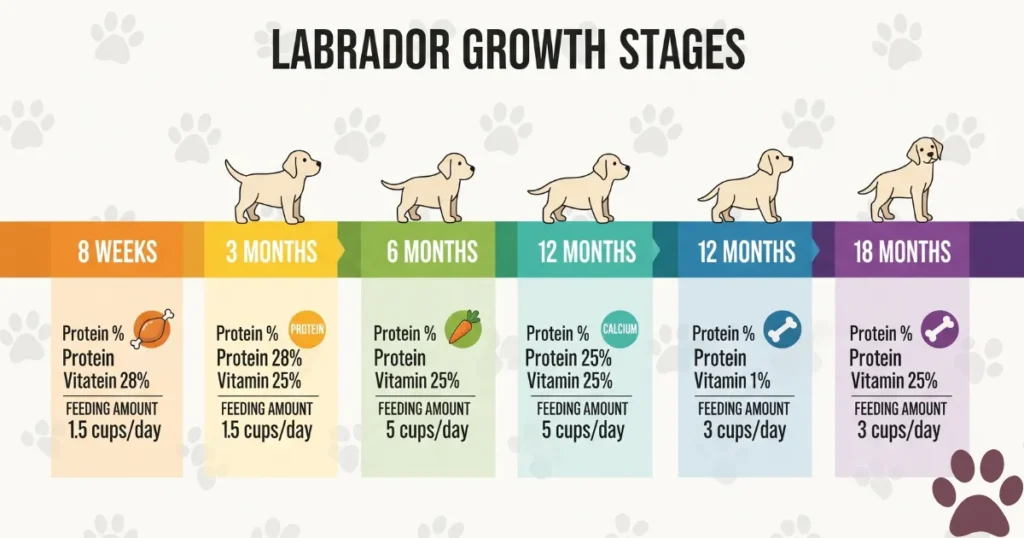
Essential Nutritional Components for Lab Puppies
Protein Requirements for Growing Labs
Optimal Protein Levels
Best dog food for lab puppies should contain 28-32% protein to support muscle development and overall growth. This higher protein requirement compared to adult dogs reflects puppies’ rapid tissue development and increased metabolic demands during their growth phase.
High-Quality Protein Sources
Premium recommended puppy food for labs features identifiable meat sources like deboned chicken, salmon, lamb, or turkey as primary ingredients. These complete proteins provide all essential amino acids necessary for proper development, much like quality nutrition supports Golden Retriever puppy growth.
Protein Digestibility
Young digestive systems require highly digestible proteins found in quality best dog food for lab puppies. Look for foods with digestibility ratings above 80% to ensure maximum nutrient absorption and minimal digestive stress.
Fat Content and Brain Development
Essential Fat Requirements
Growing Lab puppies need 15-20% fat content in their recommended puppy food for labs to support brain development, coat health, and energy provision. DHA (docosahexaenoic acid) is particularly important for cognitive development and visual acuity.
Omega Fatty Acid Importance
Quality good dog food for lab puppies includes omega-3 and omega-6 fatty acids from sources like fish oil and flaxseed. These essential fats support brain development, reduce inflammation, and promote healthy skin and coat development.
Fat Quality Considerations
The source and quality of fats in recommended puppy food for labs matter significantly. Named fat sources like “chicken fat” or “salmon oil” are preferable to generic “animal fat” listings that may indicate lower-quality ingredients.
Carbohydrates and Energy Support
Complex Carbohydrate Benefits
Best dog food for lab puppies emphasizes complex carbohydrates from sources like sweet potatoes, brown rice, and oats. These ingredients provide sustained energy release, supporting active puppies without causing blood sugar fluctuations.
Avoiding Simple Carbs
Quality recommended puppy food for labs avoids excessive simple carbohydrates from corn syrup or sugar that can contribute to hyperactivity, digestive upset, and poor nutritional habits.
Fiber for Digestive Health
Appropriate fiber levels (3-4%) in the best dog food for lab puppies support healthy digestion and help regulate bowel movements during the transition from milk to solid food.
Vitamins and Minerals for Development
Calcium and Phosphorus Balance
Recommended puppy food for labs must contain carefully balanced calcium and phosphorus ratios (1.2:1 to 1.8:1) to support proper bone development without encouraging too-rapid growth that can lead to skeletal problems.
Essential Vitamin Requirements
Growing puppies need adequate vitamins A, D, E, and K, plus B-complex vitamins to support various developmental processes. Quality best dog food for lab puppies includes these vitamins from natural sources when possible.
Trace Mineral Importance
Minerals like zinc, iron, copper, and selenium play crucial roles in immune system development, making their inclusion in recommended puppy food for labs essential for healthy growth.
Age-Specific Feeding Guidelines for Lab Puppies
Newborn to Weaning (0-8 weeks).
Mother’s Milk Importance.
During the first eight weeks, puppies should ideally receive their mother’s milk, which provides perfect nutrition ratios and essential antibodies. If hand-rearing is necessary, veterinary-approved milk replacers bridge the gap until the best dog food for lab puppies can be introduced.
Early Weaning Considerations.
Some puppies may begin showing interest in solid food around 3-4 weeks. Introducing softened recommended puppy food for labs mixed with warm water or puppy milk replacer can ease the transition process.
Weaning to 4 Months.
Gradual Food Introduction.
The transition to the best dog food for lab puppies should be gradual, starting with softened kibble mixed with liquid and gradually reducing the moisture content as puppies adapt to solid food textures.
Feeding Frequency Requirements.
Young Lab puppies need frequent meals to support growth and maintain stable blood sugar levels:.
- 8-12 weeks: 4 meals daily.
- 12-16 weeks: 3-4 meals daily.
Portion Size Guidelines.
Recommended puppy food for labs packages typically include feeding guidelines, but individual puppies may need adjustments based on growth rate, activity level, and body condition.
4-8 Months Growth Phase.
Continued Development Support.
During this rapid growth phase, best dog food for lab puppies remains essential for supporting continued bone development, muscle growth, and organ maturation.
Meal Schedule Adjustments.
Most Lab puppies can transition to three meals daily during this period, with larger portions to accommodate their growing appetites and increased activity levels.
Activity Level Considerations.
As puppies become more active and start basic training, their recommended puppy food for labs portions may need adjustment to support increased energy expenditure.
8-18 Months Maturation Period.
Slowing Growth Rates.
Growth rates begin slowing during this period, but best dog food for lab puppies remains important until Labs reach physical maturity around 12-18 months of age.
Transition Preparation.
Most Labs can begin transitioning to adult food around 12-15 months, though large males may benefit from puppy nutrition until 18 months of age.
Individual Variation Considerations.
Some Labs mature earlier or later than average, requiring individualized approaches to recommended puppy food for labs duration and adult food transition timing.
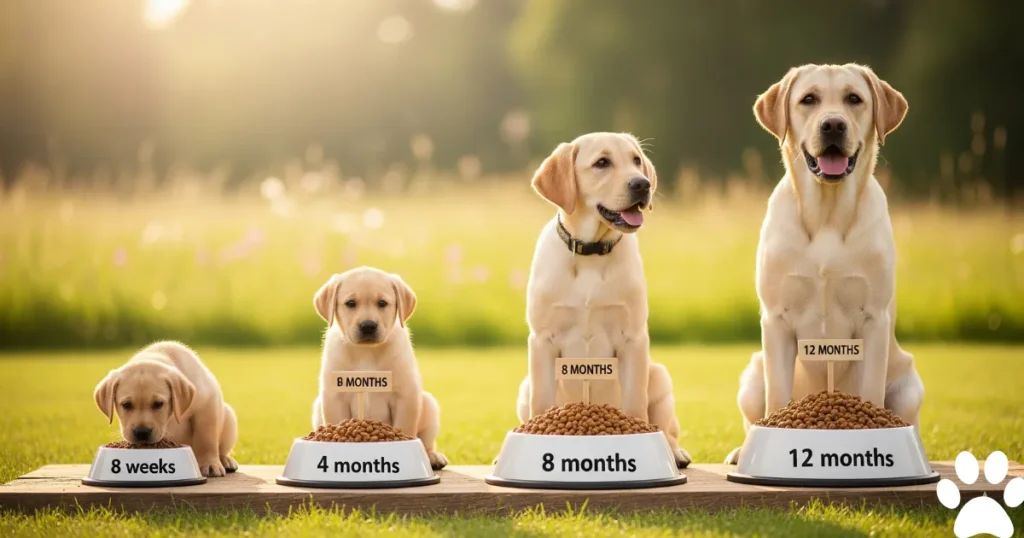
Feeding Schedules and Portion Control.
Establishing Consistent Meal Times.
Routine Importance.
Lab puppies thrive on consistent feeding schedules that help regulate digestion, support house training efforts, and establish healthy eating habits. Regular meal times with best dog food for lab puppies create predictable routines that benefit both puppies and their families.
Optimal Feeding Times.
Most experts recommend spacing meals evenly throughout the day, with the last meal several hours before bedtime to support overnight house training success.
Weekend Consistency.
Maintaining consistent feeding schedules with recommended puppy food for labs, even on weekends, helps puppies develop strong internal rhythms and reduces digestive upset.
Portion Control Strategies.
Measuring Accuracy.
Use actual measuring cups rather than estimating best dog food for lab puppies portions. Even small measurement errors can lead to overfeeding or underfeeding during crucial growth periods.
Body Condition Monitoring.
Regular assessment of your Lab puppy’s body condition helps determine if the recommended puppy food for labs portions are appropriate. Puppies should have a slight waist when viewed from above and ribs that are easily felt but not visible.
Growth Rate Considerations.
Puppies experiencing rapid growth spurts may need temporary increases in best dog food for lab puppies portions, while those growing more slowly might need slight reductions to prevent excessive weight gain.
Free Feeding vs. Scheduled Feeding.
Scheduled Feeding Benefits.
Most veterinarians and animal behaviorists recommend scheduled feeding with recommended puppy food for labs rather than free feeding to support house training, prevent overeating, and monitor appetite changes.
House Training Support.
Consistent meal schedules help predict elimination timing, making house training more effective and reducing accidents in the home.
Multi-Pet Household Considerations.
Scheduled feeding prevents competition between pets and ensures each puppy receives appropriate best dog food and dry dog food for lab puppies without interference from other animals.
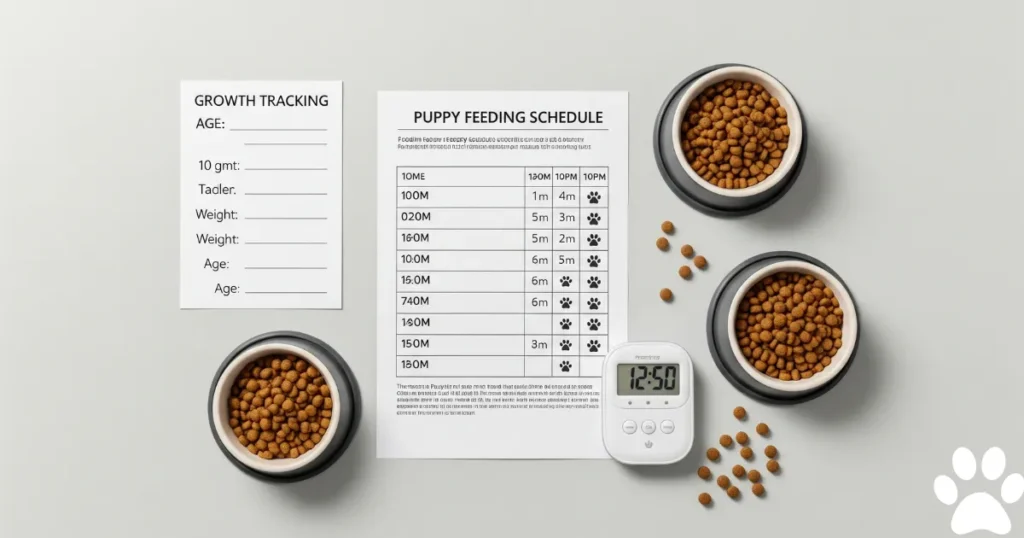
Common Puppy Feeding Mistakes to Avoid.
Overfeeding Dangers.
Rapid Growth Risks.
Overfeeding recommended puppy food for labs can cause too-rapid growth, stressing developing joints and potentially contributing to hip dysplasia, elbow dysplasia, and other orthopedic problems common in large breeds.
Obesity Prevention.
Establishing healthy eating habits early prevents obesity-related health issues throughout your Lab’s lifetime. Proper portions of the best dog food for lab puppies support optimal growth without excess weight gain.
Long-term Health Impact.
Feeding practices during puppyhood can influence lifelong eating behaviors and health outcomes, making the appropriate recommended puppy food for labs portions crucial for long-term wellbeing.
Inappropriate Food Choices.
Adult Food Too Early.
Feeding adult dog food before Labs reach maturity deprives growing puppies of essential nutrients found in best dog food for lab puppies. Adult formulations typically contain insufficient protein and fat for proper puppy development.
Human Food Dangers.
Many human foods are toxic to puppies or can cause digestive upset. Stick to high-quality recommended puppy food for labs and approved puppy treats to ensure nutritional safety.
Generic Puppy Foods.
Not all puppy foods meet the specific needs of large breed dogs like Labs. Choose the best dog food for lab puppies, specifically formulated for large breed puppy development.
Feeding Schedule Inconsistencies.
Irregular Meal Times.
Inconsistent feeding schedules can disrupt digestion and make house training more challenging. Maintain regular meal times with recommended puppy food for labs for optimal results.
Skipping Meals.
Young puppies can develop hypoglycemia if meals are skipped. Ensure consistent access to the best dog food for lab puppies according to age-appropriate schedules.
Top Recommended Puppy Food Brands for Labs.
Premium Brand Options.
Royal Canin Labrador Retriever Puppy.
Specifically formulated for Lab puppies, this recommended puppy food for labs addresses breed-specific needs, including controlled growth rate and digestive support. Contains optimal protein levels and kibble shape designed for Lab puppy mouths.
Hill’s Science Diet Large Breed Puppy.
Scientifically formulated best dog food for lab puppies with controlled calcium levels for proper bone development. Includes DHA for brain and vision development, plus high-quality proteins for healthy growth.
Blue Buffalo Life Protection Puppy Large Breed.
Features real meat as the first ingredient and includes LifeSource Bits with antioxidants, vitamins, and minerals. The best puppy food for labs avoids by-product meals and artificial preservatives.
Wellness Core Puppy Large Breed.
Grain-free option with high protein content and probiotics for digestive health. This best dog food for lab puppies, emphasizes natural ingredients and controlled mineral levels for large breed development.
Budget-Friendly Quality Options.
Purina Pro Plan Large Breed Puppy.
Offers excellent nutrition at moderate prices with real chicken as the primary ingredient. Includes DHA for brain development and probiotics for digestive health in this recommended puppy food for labs.
Diamond Naturals Large Breed Puppy.
Features cage-free chicken and sweet potatoes, providing quality best dog food for lab puppies nutrition at affordable prices. Includes probiotics and antioxidants for immune system support.
Nutro Ultra Large Breed Puppy.
Combines multiple protein sources and includes omega fatty acids for coat health. This recommended puppy food for labs offers good value with natural ingredients and no artificial colors or preservatives.
Prescription and Special Diet Options.
Hill’s Prescription Diet Puppy.
For puppies with specific health needs, prescription formulations provide targeted nutrition. Consult veterinarians about whether specialized best dog food for lab puppies is necessary for your individual puppy.
Royal Canin Veterinary Diet Puppy.
Medical nutrition for puppies with digestive sensitivities or other health concerns. These specialized recommended puppy food for labs require veterinary oversight and monitoring.
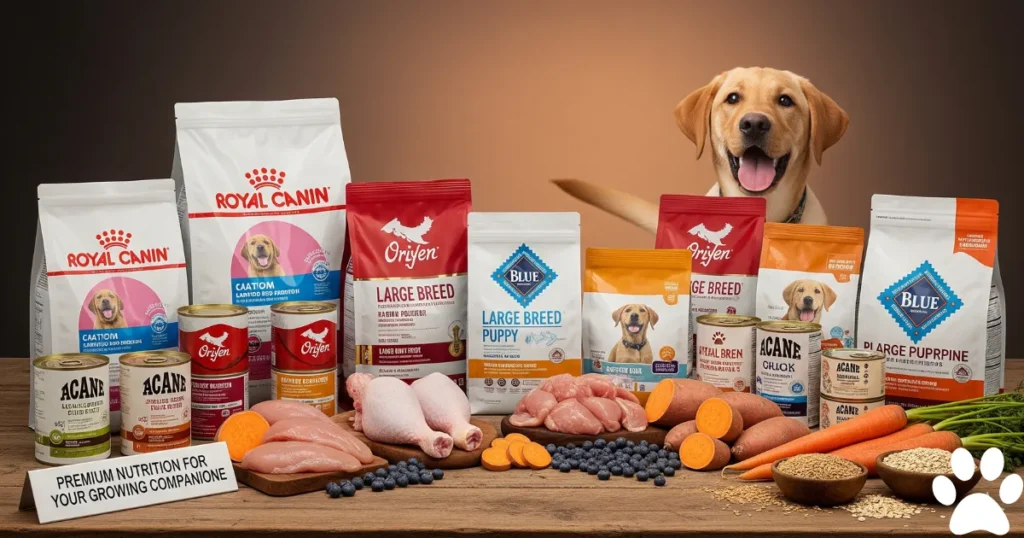
Transitioning to Adult Food.
Timing the Transition.
Physical Maturity Indicators.
Most Labs can begin transitioning from best dog food for lab puppies to adult formulations around 12-15 months when they reach approximately 90% of their expected adult size.
Individual Variation Considerations.
Large male Labs may benefit from continued recommended puppy food for labs until 18 months, while smaller females might transition earlier. Monitor individual growth rates rather than relying solely on age.
Veterinary Guidance.
Consult with veterinarians about optimal transition timing based on your Lab’s specific development pattern and health status.
Gradual Transition Process.
Standard Transition Schedule.
When moving from best dog food for lab puppies to adult food, use a gradual 7-10 day process:.
- Days 1-3: 75% puppy food, 25% adult food.
- Days 4-6: 50% puppy food, 50% adult food.
- Days 7-10: 25% puppy food, 75% adult food.
Monitoring During Transition.
Watch for digestive upset, appetite changes, or behavioral differences when transitioning from recommended puppy food for labs to adult formulations.
Adult Food Selection.
Choose adult food from the same manufacturer when possible to minimize digestive disruption, or select high-quality options that address your Lab’s specific adult needs.
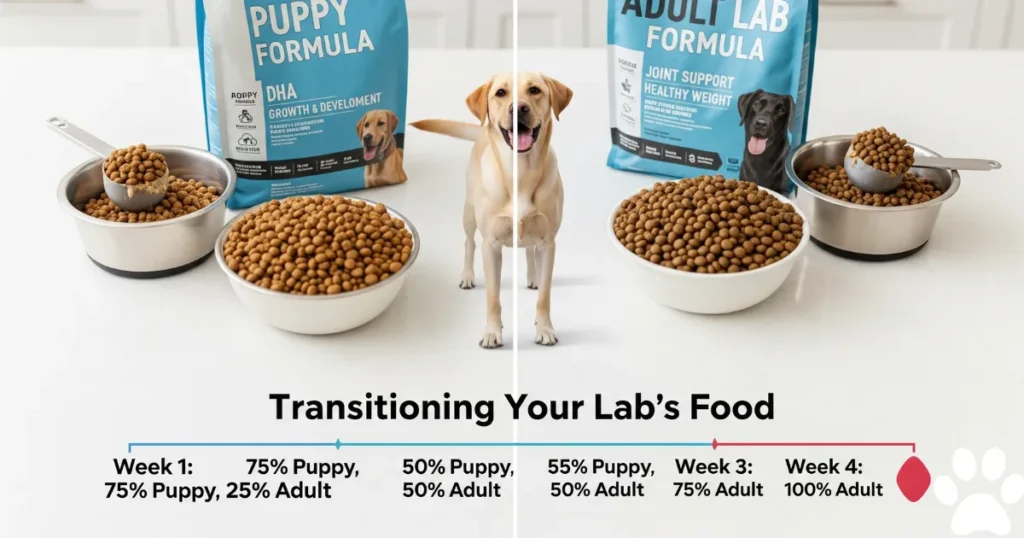
Special Considerations and Health Issues.
Large Breed Development Concerns.
Hip Dysplasia Prevention.
Proper nutrition with best dog food for lab puppies formulated for large breeds helps support healthy hip development and may reduce the risk of hip dysplasia through controlled growth rates.
Elbow Dysplasia Considerations.
Similar to hip concerns, appropriate recommended puppy food for labs with balanced minerals and controlled calories supports healthy elbow development during crucial growth periods.
Osteochondrosis Prevention.
This joint cartilage condition can be influenced by nutrition during growth. Quality best dog food for lab puppies with appropriate mineral ratios supports healthy cartilage development.
Digestive Health Support.
Probiotic Benefits.
Many quality recommended puppy food for labs includes probiotics to support developing digestive systems and promote healthy gut bacteria establishment.
Digestive Sensitivity Management.
Some Lab puppies may have sensitive stomachs requiring easily digestible, best dog food for lab puppies with limited ingredients or novel protein sources.
Diarrhea and Upset Prevention.
Consistent feeding with high-quality recommended puppy food for labs helps prevent digestive upset that can occur with frequent diet changes or poor-quality ingredients.
Allergy and Food Sensitivity Considerations.
Common Puppy Allergies.
Some Lab puppies may develop sensitivities to common proteins like chicken or beef. Best dog food for lab puppies with novel proteins like salmon or lamb may help sensitive individuals.
Grain Sensitivity Signs.
Watch for signs of grain sensitivity, including digestive upset, skin irritation, or poor coat quality, that might indicate the need for grain-free recommended puppy food for labs.
Elimination Diet Process.
If allergies are suspected, work with veterinarians to conduct elimination diets using limited ingredient best dog food for lab puppies to identify problematic ingredients.
Homemade vs. Commercial Puppy Food.
Commercial Food Advantages.
Nutritional Completeness.
Quality recommended puppy food for labs undergoes extensive testing to ensure complete and balanced nutrition that meets all developmental needs without guesswork or supplementation requirements.
Convenience and Consistency.
Commercial best dog food for lab puppies provides consistent nutrition batch after batch, eliminating daily preparation time and ensuring reliable nutritional content.
Safety and Quality Control.
Reputable manufacturers implement strict quality control measures and safety protocols that would be difficult to replicate in home kitchens.
Homemade Diet Considerations.
Nutritional Complexity.
Creating nutritionally complete, homemade recommended puppy food for labs requires extensive knowledge of puppy nutrition and careful attention to vitamin and mineral ratios.
Professional Guidance Required.
Veterinary nutritionists should oversee homemade puppy diet formulation to ensure all nutritional needs are met during crucial growth periods.
Time and Cost Factors.
Preparing balanced homemade best dog food for lab puppies requires significant time investment and may cost more than high-quality commercial alternatives.
Professional Guidance and Veterinary Care.
Regular Puppy Health Checks.
Growth Monitoring.
Regular veterinary visits allow professionals to assess whether the current recommended puppy food for labs is supporting appropriate growth rates and development patterns.
Nutritional Counseling.
Veterinarians can provide personalized advice about the best dog food for lab puppies based on individual puppy needs, growth patterns, and health considerations.
Vaccination and Feeding Coordination.
Coordinate feeding schedules with vaccination appointments to minimize stress and support optimal immune system development.
Working with Veterinary Nutritionists.
Specialized Dietary Planning.
For puppies with complex health needs, veterinary nutritionists can recommend or design specialized recommended puppy food for labs that addresses specific medical conditions.
Growth Optimization.
Professional guidance ensures best dog food for lab puppies supports optimal growth without encouraging problems associated with too-rapid development.
Warning Signs Requiring Professional Attention.
Growth Abnormalities.
Unusually rapid or slow growth rates may indicate the need for dietary adjustments or medical evaluation beyond standard recommended puppy food for labs recommendations.
Digestive Issues.
Persistent diarrhea, vomiting, or appetite loss requires professional evaluation to rule out health problems and adjust feeding practices accordingly.
Behavioral Changes.
Sudden changes in eating behavior, energy levels, or general demeanor may indicate health issues requiring veterinary attention and possible dietary modifications.
What is the best dog food for lab puppies under 12 weeks old?
Best dog food for lab puppies under 12 weeks should be a high-quality large breed puppy formula with 28-32% protein and 15-20% fat. Start with softened kibble mixed with warm water to ease the transition from milk, feeding 4 small meals daily.
How much recommended puppy food for labs should I feed daily?
Feed according to your puppy’s age and weight: 8-12 weeks need about 2-3 cups daily, divided into 4 meals, 3-6 months need 3-4 cups in 3 meals, and 6-12 months need 4-5 cups in 2-3 meals. Adjust based on body condition and growth rate.
When should I switch from puppy to adult food for my Lab?
Most Labs should transition from recommended puppy food for labs to adult food around 12-15 months of age, though large males may benefit from puppy food until 18 months. Look for signs of slowed growth and consult your veterinarian for timing.
What ingredients should I look for in the best dog food for lab puppies?
Look for named meat proteins as the first ingredient, DHA for brain development, controlled calcium and phosphorus levels, omega fatty acids, and probiotics. Avoid by-products, excessive fillers, and artificial preservatives in best dog food for lab puppies.
Can Lab puppies eat the same food as Golden Retriever puppies?
Yes, recommended puppy food for labs works well for Golden Retriever puppies too, as both are large breed dogs with similar nutritional needs during growth. Both breeds benefit from controlled growth formulas and joint-supporting ingredients.
How do I know if my Lab puppy is eating enough?
A well-fed puppy on appropriate best dog food for lab puppies should have steady weight gain, good energy levels, and a slight waist when viewed from above. Ribs should be easily felt but not visible. Consult your veterinarian if you’re concerned about growth rates.
What should I do if my Lab puppy won’t eat their puppy food?
First, ensure the recommended puppy food for labs is fresh and properly stored. Try adding warm water to soften kibble, feeding smaller, more frequent meals, or consulting your veterinarian to rule out health issues. Avoid adding table scraps that might reduce appetite for puppy food.
Is grain-free puppy food better for Lab puppies?
Grain-free isn’t automatically better unless your puppy has specific grain sensitivities. Many quality best dog food for lab puppies contain beneficial whole grains. Recent research suggests some grain-free diets may be linked to heart issues, so choose based on individual needs.
How do I transition my Lab puppy to new food?
Transition gradually over 7-10 days by mixing increasing amounts of the new recommended puppy food for labs with decreasing amounts of the old food. Start with 25% new food and increase by 25% every 2-3 days to prevent digestive upset.
What are the signs of food allergies in Lab puppies?
Watch for persistent digestive upset, skin irritation, excessive scratching, ear infections, or poor coat quality. If you suspect allergies, work with your veterinarian to identify problematic ingredients and find appropriate best dog food for lab puppies alternatives.
Final Thoughts.
Selecting the recommended puppy food for labs is a fundamental decision that shapes your puppy’s entire development and sets the foundation for lifelong health. Quality puppy nutrition during these crucial early months supports proper growth, bone development, brain function, and immune system maturation that will benefit your Lab throughout their adult life.
Understanding the specific nutritional needs of Lab puppies– from their requirements for higher protein and fat content to the importance of controlled mineral ratios for large breed development– enables pet parents to make informed decisions about best dog food for lab puppies. The investment in premium puppy nutrition during this critical growth period pays dividends in stronger bones, healthier joints, better digestive health, and overall vitality.
Remember that each Lab puppy is unique, with individual growth patterns, preferences, and sensitivities that may require adjustments to standard feeding guidelines. Regular monitoring of your puppy’s body condition, growth rate, and overall health helps ensure their recommended puppy food for labs continues to meet their evolving needs as they mature.
The transition from puppyhood to adulthood is gradual, and nutritional needs change throughout this process. Maintaining open communication with your veterinarian, staying informed about your puppy’s development, and being prepared to adjust feeding practices as needed will help ensure your Lab puppy receives optimal nutrition throughout their growth journey.
By choosing high-quality best dog food for lab puppies and following proper feeding practices, you’re giving your furry companion the best possible start in life. This nutritional foundation supports not only healthy physical development but also the energy and vitality that will make your Lab a wonderful family companion for years to come.
Featured Blogs

Best Dog Food for Labs: The Complete Guide to Feeding Your Labrador Retriever – 2025
When it comes to finding the best dog food for labs, pet parents often feel overwhelmed by the countless options...

Good Dog Food for Labs: Essential Guide to Quality Nutrition for Labradors and Golden Retrievers
Finding good dog food for labs doesn't have to be overwhelming when you understand what makes nutrition truly beneficial for...
Dr. Nabeel A.
Hi, I’m Dr. Nabeel Akram – a farm management professional by trade and a passionate Golden Retriever enthusiast at heart. With years of experience in animal science and livestock care, I’ve built a career around understanding animals—how they live, thrive, and bring value to our lives. This blog is a personal project born from that same passion, focusing on one of the most loyal and lovable breeds out there: the Golden Retriever. Whether I’m managing farm operations or sharing insights on canine health, behavior, and care, it all ties back to one core belief—animals deserve thoughtful, informed, and compassionate attention. Welcome to a space where professional expertise meets genuine love for dogs.
Facebook |
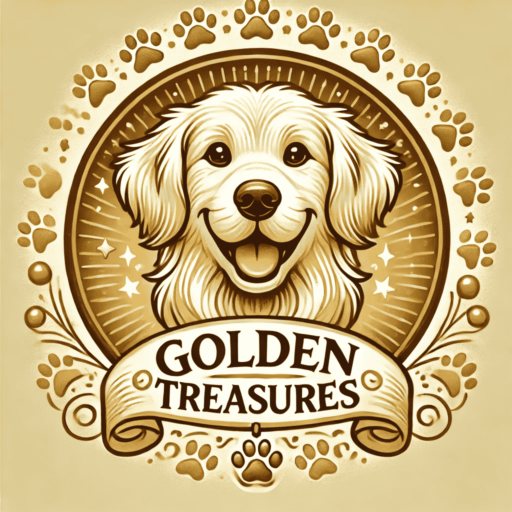

Links will be automatically removed from comments.